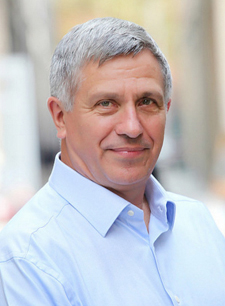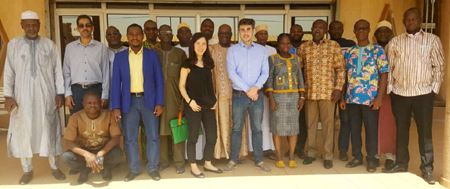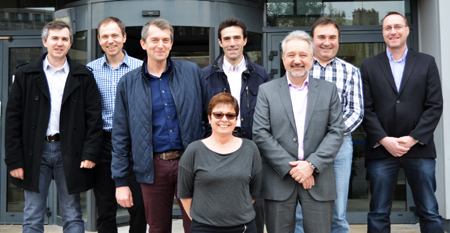 |  Data have become a central part of all of today’s economic and societal debates. We are only just starting to gauge the possibilities being opened up by the use of these massive quantities of data, which are an increasingly integral part of how businesses and markets operate. But what is also still only nascent is public authorities’ awareness of the ways in which data are being used, with respect to codes of conduct, consumer protection, privacy protection and competition law.
Data have become a central part of all of today’s economic and societal debates. We are only just starting to gauge the possibilities being opened up by the use of these massive quantities of data, which are an increasingly integral part of how businesses and markets operate. But what is also still only nascent is public authorities’ awareness of the ways in which data are being used, with respect to codes of conduct, consumer protection, privacy protection and competition law.
Employing users’ data to optimise online advertising is a good example of how the situation is changing. The ability to deliver targeted ads to an internet user based on their centres of interest, as revealed by their browsing habits, has revolutionised the online advertising sector. At the same time, the internet is becoming the largest advertising medium, and so underscoring the growing influence that digital networks have on our lives. Advertising needs to go after consumers wherever they spend their time, get their news or seek entertainment, and where, more and more, they go to shop for goods and services. At the same time, today’s advertising is a whole new animal: we can now send a highly targeted ad that zeroes in on a single person and the thing she is interested in at that moment. To this end, having access to data and to technologies that provide the ability to tailor advertisements to the website that users are visiting, in real time, has become vital to remaining competitive. Certain players are especially well equipped to go into battle. After having having analysed how the online advertising sector operates, the Competition Authority identified the reasons behind the current success of companies such as Facebook and Google. But, when it comes to exploring this topic with respect to competition issues, or in terms of privacy concerns or safeguarding against political campaign meddling, we are still in the early stages…
Isabelle de Silva, Chair of France’s Competition Authority

|  |
 |
Regulation in action
Optical fibre: regulating to avoid a Wild West
In response to a request from the Senate, last October Arcep delivered an opinion on regional digital coverage. It provided an opportunity for Arcep to confirm with conviction the validity of the network sharing model that governs fibre to the home (FttH) rollouts in France.
Arcep pointed out several months ago that, to be able to achieve the Government’s superfast rollout objectives, the pace of rollouts needed to accelerate. However, some of operators’ practices could well undermine the goal of achieving consistent deployments. In particular, Arcep notes:
- Risks resulting from certain infrastructure operators’ regional pre-empting strategies;
- Inefficient plans for overlapping networks;
- Risks of skimming, in other words rollout schemes that do not plan to cover the most costly lines, while making it impossible for another operator to do so.
As a follow-up to this opinion, Arcep recently published a draft recommendation for public consultation, whose purpose is to clarify the way in which operators must implement rollout coordination obligations.
In addition to this text, Arcep must deliver an opinion on binding commitments on fibre rollouts from Orange and SFR in those parts of the country where the Government has issued a call for investment letters of intent (called “zones AMII” in French) – in accordance with Article L. 33-13 of the French Postal and Electronic Communications Code (CPCE). The draft recommendation published for consultation seeks to clarify the rules governing rollouts, whereas this opinion will relate to the scope of and roadmap for rollouts.
Find out more on the Arcep public consultation
The Government requests Arcep’s opinion on the proposed binding commitments from Orange and SFR (in French)
Interview with Arcep Chair, Sébastien Soriano, with public sector representatives in November 2017 (in French)
|  |
 |
|
On our radar
| |
Jacques Cremer, Professor of Economics, at the Toulouse School of Economics
Jacques Cremer has just been appointed by the European Commission to be a special adviser to the European Commissioner for Competition, Margrethe Vestager. This is a one-year appointment (1 April 2018 to 31 March 2019) that he will share with Heike Schweitzer, Professor of Law at Humboldt University in Berlin, and Yves-Alexandre de Montjoye, Assistant Professor of Data Science at Imperial College London. Their mandate: to explore the future challenges of digitisation for competition policy. A report on the topic will be produced before March 2019.
Find out more
| 
|
|
| |  | |
News from around the world
5G in Japan: is France really that far behind? – by Pierre-Jean Benghozi, Arcep Executive Board member
Japan’s lead in 5G is the stuff of headlines. But it is to France that the country has turned for inspiration when rethinking spectrum management. So several observations can help put France’s supposed “lagging behind” into perspective.
- Despite very proactive announcements of commercial 5G rollouts starting in 2020, the first plans will be delivered more using e-LTE than with “true” 5G which will only become available later on. Some of Japan’s economic stakeholders are already concerned about the lack of clarity on future allocation rules.
- Japan shares France’s crucial challenge of achieving nationwide connectivity and coverage. Because it is an archipelago, Japan needs to ensure consistency between densely populated, profitable areas and the thousands of islands whose geographical remoteness and low population density are not likely to attract private sector rollouts.
- This is why Japanese authorities are especially interested in the New Deal that was recently put into place in France, which offers an alternative between beauty contests and classic auctions to ensure that all spending on frequencies constitutes an efficient investment that benefits network rollouts everywhere.
These conclusions can only encourage Arcep to stay the course, and maintain the roadmap set for 5G: calling on vertical industry players and operators to come together on pilot projects in 2018, followed by allocations and service rollouts in 2020.
|
| |
 |
Field notes
Sharing best practices – Arcep teams travel to Ouagadougou
In February, an Arcep team spent a week in Ouagadougou, in Burkina-Faso, to take part in the Telecom ParisTech 2018 “Telecommunications regulation” Badge training, with which the Authority has been associated for almost 10 years now.
Two Arcep staff members, from the Legal Affairs and Mobile and Innovation departments, had prepared a module on the legal and technical-economic underpinnings of telecoms regulation. Some 20 participants were invited to attend Arcep’s event in Burkina-Faso, from among the regulators as well as the ministries and network operators from some 10 different Africa countries. The status of regulator, institutional elements, competition law, key legal aspects of a regulator’s decisions, market analyses, penalty procedures, data regulation and mobile frequency allocation: these topics were discussed in great depth and detail with the participants.
 |  |
 |
Meanwhile in Brussels...
On 28 March, the Centre on Regulation in Europe (CERRE) delivered its report on zero-rating in Europe. To mark the occasion, the Centre hosted an afternoon of debates whose participants included Arcep Chair, Sébastien Soriano, as well as DG Connect, the Chair of BEREC, BEUC, as well as Europe’s main telcos and leading internet companies.
Sébastien Soriano issued a reminder that freedom of choice is a central tenet of net neutrality, which must not be confined to only economic issues. He also spoke of the recommendations that Arcep set out in a dedicated report, to limit the influence that devices (smartphones, tablets, voice assistants) have on internet openness.
The afternoon’s other highlights included interesting discussions on data economics, the markets being built around these data, the competition issues they create and the regulatory questions they raise.

|  |
 |
Arcep, telling it like it is
 Frequency applications: making it paperless! Frequency applications: making it paperless!
One of Arcep’s responsibilities is to allocate frequencies. The Authority naturally allocates frequencies dedicated to 3G and 4G (and soon 5G…) mobile networks, but not only. Our unit also has the task of allocating frequencies for:
- radio relay systems (point to point links);
- fixed satellite services’ ground stations;
- professional mobile radio networks (PMR);
- non-mobile network trials (drones, radars…).
Let us pause a minute on radio relay systems. Who uses them today? In the vast majority (80%) of cases it is France’s four main mobile operators, who use them to increase the density of their networks, and particularly to connect their towers to the internet. They are, however, also used by radio stations, manufacturing and transportation companies, local authorities and hospitals to interconnect their different premises.
Up until now, any allocation (or amendment/cancellation) requests for radio relay frequencies were submitted to Arcep by mail. And that made for a lot of letters! Our team processed no fewer than 30,500 radio relay (allocation/amendment/cancellation) transactions in 2017.
But paper will soon be a thing of the past. In a few days, Arcep’s procedure will have become fully digitised, once its online “Frequency management” portal goes live. This tool will save time and space and create a more efficient process, for both applicants and us. Once the request is logged, we check that there is no danger of interference with other frequency users. Then it is up to us to prepare the official allocation (or amendment/cancellation) decision, and sign it (still on paper… for now!) A considerable time saver for our unit whose responsibilities are expanding, as it is becoming a technical study division for 5G trials and superfast radio systems.
The “Frequency Management” Unit
Jean-Luc Stevanin, Yann Alamandy, Marc Caillet, Denis Catinot, Pierre Constant, Ginette Faye, Gérard Giraudon, Igor Lallemant, Bruno Maglione, Johann Menneguerre
|  |
 |
Mark your calendar

“Telconomics” Conference | 22 May 2018 in Paris
On 22 May, Arcep will publish its scorecard for telecoms markets in France in 2017. The Authority will present core market data to the press and financial analysts: spending on fixed and mobile networks, operators’ revenue, superfast fixed network subscription numbers, key figures on 3G and 4G networks in France…
Operators have moved into a new investment dynamic over the past three years. A dynamic in line with a course of action that Arcep is carrying out on several fronts: pro-investment regulation. This conference will provide an opportunity to deliver an update on the actions that Arcep is conducting in this area, and to set out the sector’s upcoming challenges.
Open to members of the press and financial analysts/By invitation only
“Arcep’s pro-investment regulation: one ambition, actions, results” in French (January 2018) - In French
|  |
 |
15 to 17 May in Marne-la-Vallée
Geomatics and data use at FOSS4G-FR 2018
Hosted by the OSGeo-fr association, this conference will be taking place from 15 to 17 May, at the École Nationale des Sciences Géographiques. FOSS4G-FR is a day of technical workshops and two days of conferences devoted to exploring innovative initiatives in this area. Arcep will be on hand to talk about how and why it came to create its own population database for the French overseas departments, after having ascertained the lack of reliable data sources able to meet its needs, but also with a view to obtaining an homogenous method for calculating operators’ 2G, 3G and 4G mobile coverage.
Find out more
24 to 26 May 2018 in Paris
Viva Technology
For anyone who is passionate about innovation and the digital economy, Viva Technology is the place to be in late May! Conferences, keynotes and demonstrations will shape the third edition of this trade show dedicated to start-ups and innovation. The first two days will be open to professionals only, but the show will open its doors to the public on Saturday, 26 May. Arcep will be there with the government agencies involved in French Tech Central, to talk about its dedicated services and support provided to start-ups: regulatory sandbox, 5G trials, etc.
Find out more
29 and 30 May 2018 in Paris
AVICCA spring TRIP
With the support of the Caisse des Dépôts, AVICCA will be hosting its spring symposium, “Territories and public-initiative networks” on 29 and 30 May. On the programme: the latest PIN developments, a look back at the mobile agreement, the first superfast radio assignments, and smart territories.
Find out more
| |

 |
|  |
|

